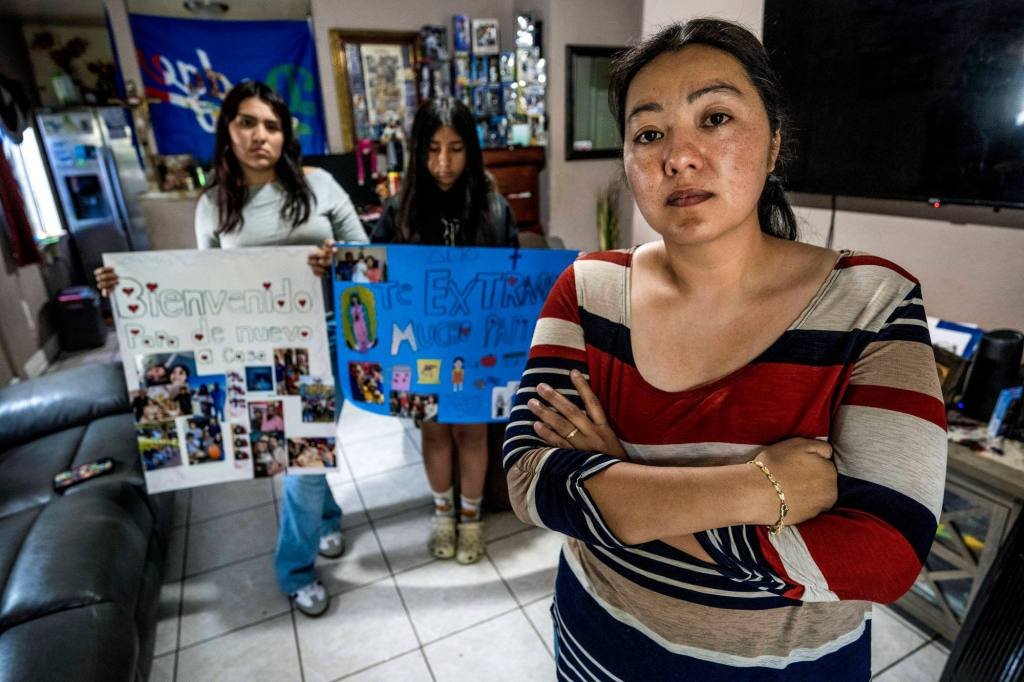The Journey of Hope: Maria Murillo’s Family Struggles with Immigration Laws
At the beginning of the week, Maria Murillo and her family in Pomona were brimming with optimism. They believed they were on the verge of a joyful reunion with her husband, José Luis Zavala, who had endured a month of separation due to a recent crackdown on undocumented immigrants. Zavala, a dedicated gardener and father, found himself swept into the chaos of President Donald Trump’s aggressive immigration policies, now detained in a Texas facility. As his family grappled with the fluctuating landscape of federal immigration law, the looming question persisted: would they finally be reunited?
Zavala’s case mirrors the plight of many families trapped in a convoluted federal immigration system. With the directives issued by the Trump administration complicating the already murky waters of immigration law, countless families like Murillo’s find themselves caught in a limbo of rising uncertainty. “Be prepared for surprises,” warned Zavala’s attorney, as they navigated a new and increasingly hostile environment toward immigrants. The uncertainty this family faced highlighted the dramatic implications of evolving federal guidance—potentially affecting their ability to see their loved ones again.
The complexities of the federal immigration system became glaringly apparent for Zavala and his family after he was detained during a routine job in La Mirada. The text he sent to his wife captured their emotional turmoil: “I’m (expletive).” Maria rushed to the downtown Los Angeles ICE detention center, desperate to deliver essential medication for his diabetes. She and their children left that day, tears in their eyes, uncertain about Zavala’s fate amid a blanket of newly intensified raids targeting undocumented immigrants. For this family, the traumatic weight of questions loomed: Could he be deported immediately? Would he receive medical care?
Zavala’s immigration history further complicated matters. He had previously returned to Mexico, crossing back into the U.S. in 2006 under questionable circumstances. Although he had a DUI charge from 2005—now cleared due to California’s Penal Code §1473.7—this past was weaponized by authorities. According to DHS, the context of his undocumented status branded Zavala as one of the “worst of the worst,” despite years of stable contributions to society and his family. The relentless march toward deportation under the Trump administration set the stage for uncertain outcomes.
Just when hope flickered, a significant development arose: Zavala’s attorney prepared for a bond hearing that could secure his release. On one hand, Maria held onto cautious optimism; on the other, she was crippled by the fear that the government’s shift toward more stringent detention practices would prolong their suffering. As Zavala awaited his fate, a memo from ICE hinted at a drastic shift in policy, potentially extending the duration of detention for many immigrants and complicating their ability to secure bond hearings.
When the long-awaited day of the hearing arrived, Murillo and her family waited anxiously for news. The judge ruled in favor of Zavala’s release upon a $5,000 bond, injecting a brief moment of joy into the family’s turmoil. “We just started celebrating and crying and hugging each other,” Maria recounted. However, the following day, the government quickly issued an appeal against this decision—an emotional rollercoaster that left the family back at square one in their struggle for reunion.
As Murillo faces this new setback, she reflects on the broader implications of the administration’s immigration enforcement strategies. Zavala’s case has become emblematic of the disarray and unpredictability affecting many families caught in the vise of federal immigration law. With 71.7% of detainees lacking criminal convictions, the reality starkly contrasts the persistently invoked narrative of targeting the “worst of the worst.” While the immediate hope remains—communication with Zavala remains steady—Murillo wrestles with the ever-present anxiety fueled by the government’s immigration enforcement tactics.
In the end, Maria Murillo’s story exemplifies the struggles faced not just by her family, but by countless other immigrant families navigating the daunting landscape of U.S. immigration law. As uncertainty follows closely behind hope, this emotional journey encapsulates the profound impact of a rigid federal system on human lives. For parents like Maria, the fight is not merely about legalities but the emotional well-being of families longing for unity amidst chaos. Though the road ahead remains fraught with challenges, her steadfast commitment to her family serves as a source of strength in the battle for freedom and reunification.





